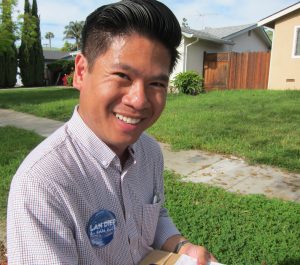
By Sharon Simonson
April 6, EAST SAN JOSE — In college, Lan Diep told people to call him Ethan. He is probably the whitest Vietnamese man I had ever met, or would meet, he tells me. He dresses in khaki pants, brown loafers and a Tattersall button-down collared shirt, tucked in, with belt. In the morning, he includes a dark sports coat.
In his “real” life, Diep is a legal-aid attorney whose fluency in Vietnamese took him to Biloxi, Miss., after the April 2010 BP oil spill as a legal fellow at the Mississippi Center for Justice. (“I detest the billable hour,” he says.) A third of the fishermen in the Gulf of Mexico states — Texas, Louisiana, Mississippi, Alabama, Florida — are Vietnamese who speak limited English. He helped them file claims against BP.
Now the 32-year-old is campaigning full time for San Jose City Council District 4, knocking on 100 doors a day. “How do you live?” I ask him as we drive to the district on the city’s northeast side. “Frugally,” he replies, after which we both remain silent for a few minutes. San Jose city council people earn $92,000 a year, plus benefits.
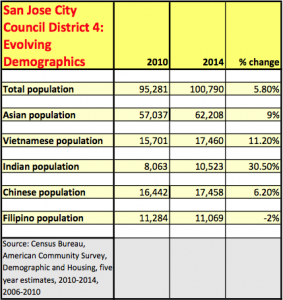
Were he elected June 7 Diep would be the first U.S.-born Vietnamese-American to serve in San Jose. (The same would be true were 38-year-old attorney Jimmy Nguyen elected in District 8. Nguyen declined to be interviewed.) Sitting council members Tam Nguyen and Manh Nguyen were born in Vietnam, as was Madison Nguyen, the first Vietnamese-American elected to the San Jose City Council, 11 years ago. (Despite their common surname, none of the officials is related.)
The distinction is deeply relevant for the Vietnamese who 41 years after the fall of Saigon and loss of their homeland remain committed to overthrowing the communist government and establishing a democratic Vietnam. For them, U.S. government and political influence, including local government, are platforms to achieve that goal. Their questions are whether and how the American-born children of refugees will take up the responsibility. “There is a certain mistrust in the community about passing the torch,” Diep says, “the idea that ‘You can’t trust these young ‘uns. They didn’t live through communism. They will be first to capitulate and let the cause die.’”
This is the second time Diep has sought the council seat. He competed against nine others in a special election last year, after Councilperson Kansen Chu, a Taiwanese-born American, was elected to the state legislature. Diep placed third and missed the runoff by 13 votes. Manh Nguyen, his only opponent in this race, secured the seat and comes to this contest with endorsements from Mayor Sam Liccardo and immediate past Mayor Chuck Reed, among others.
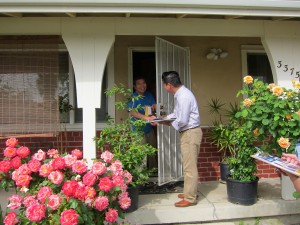
Diep and campaign worker Stephen Ngo plan to walk a Berryessa neighborhood of smaller, mostly one-story, 1950s and ‘60s ranch homes. Diep approaches a beige-and-white house with a wide porch and rose-bush hedges. He knocks and a man opens the front door, leaving a heavy-gauge screen in place. Lan speaks to him in Vietnamese and offers him a flyer. The man opens the screen to take it. They share a laugh. Soon the man is outside and signing a card that Lan later explains is a “commitment to vote.” It’s a device he learned as a staff member of the 2012 Obama campaign. “I’ll mail it back to him when it’s time to vote,” Diep says.
Asians constitute more than 60 percent of the district’s 100,000-plus residents. In the last five years, the Vietnamese population, about 17 percent of the total, has grown 11.2 percent, nearly twice as fast as the district population at large. Still, in the same time, another Asian population’s growth has outrun the Vietnamese by a wide margin: Indians. Even if he won every Vietnamese vote in the district, he would not win the race, Diep says.
After every house, he consults a smart phone where he has programmed political campaign software to cherry-pick voters for his attention. He won’t divulge his parameters for selection, “That’s the secret sauce,” he says. The people he selects appear to be from every demographic and walk of life. “Mrs. McCann?” he calls through an open window that overlooks the front stoop of another ranch house. “Yes,” replies a woman’s voice from inside.
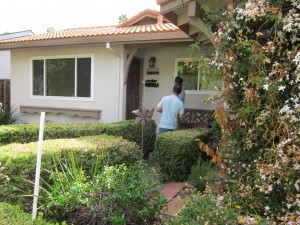
“I am Lan Diep, and I am running for city council against Manh Nguyen.” She is fully aware of the race, the woman says, her voice growing nearer. “I am hoping that you and Mr. McCann can put me over the top,” Diep says. She voted for him the last time, she replies. “Would it be all right if I put a sign in your yard?” Diep asks. Yes, she answers.
Vietnamese broadly affiliate with the U.S. Republican Party, personified by Ronald Reagan, the ultimate anti-communist American president. That tie separates them from the prevailing Democratic politics of the city, county and region, reinforcing an outsider image. Diep is a Republican. “I am from Texas,” he explains over lunch. (He was born in Houston and moved to Northern California in 1994.) “My default is to be suspicious of the idea that everyone gets something automatically as a matter of right as opposed to having to earn it or work for it. Taken to the extreme, that kernel of good intention is what my family left Vietnam to escape.”
“I do want California to be more Republican, and by the same token, I want Texas to be more Democratic,” he says.![]()
A middle-aged man wearing a faded black cotton tank-top, knee-length cargo shorts, shoulder-length hair and a beard answers the door. “You might recognize me from a year ago,” Diep says. “I don’t,” the man says flatly. “I ran last time and lost by 13 votes. I’m running against Manh Nguyen.”
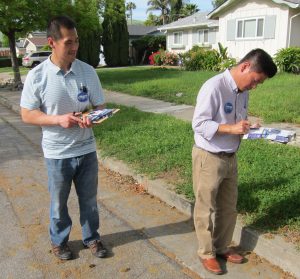
“We’ll give you full consideration,” the man says.
“What is that new thing that the city is planning?” he asks. “They got a thing where there is going to be a public hearing.” Does it involve the new sales tax? Medical marijuana, Diep asks. No, no, the man replies; he can’t remember more. “I don’t know what it is,” Diep says with slight exasperation.
“Are you a Democrat?” the man asks. “I am a Republican, but I worked for the Obama campaign,” Diep replies. “There is no Democrat in this race. Manh has declined to state.”
“Interesting,” the man responds. Rarely does he get substantive questions from people Diep says as we walk away.
As a population, Vietnamese-Americans constitute only about 10 percent of San Jose, but depending on election outcomes this year, beginning next year, they could fill three of San Jose’s 10 council seats, a first for the city. East San Jose bears the community’s mark most strongly, with dozens of Vietnamese restaurants and teahouses and even a “Little Saigon” neighborhood and Vietnam Town shopping center. But overall, by all accounts, the population remains economically poor and politically inchoate, mobilizing in response to hot-button issues but not yet organized enough to pursue an agenda.
Ngo met Diep after the candidate knocked on his family’s front door. He was persuaded to get involved by the thought that the sitting councilman was running unopposed. “My family knows Lan, knows he can speak to the community. He’s young. My parents like him. They speak Vietnamese. He speaks Vietnamese,” Ngo says. “It’s nice to help volunteer for a candidate.”
If he achieves anything with his race, it is that the San Jose Vietnamese population starts to look to the city more for local services and less for political positions on Vietnam, Diep says. But don’t be confused: He considers himself a refugee despite his U.S. birth and still seeks to free his family’s historic homeland. “My parents — particularly my mother in the 1980s and all of the way through the early 1990s — the Vietnamese community here very much believed we were living in exile. It was always about ‘one day we will be back in Vietnam,’” he says. “I still harbor that dream, but I am a bit more realistic about it.”
![]() He changed his name after college, he volunteers a few minutes before the day’s end. “I decided if I am going to make a name for myself, it should be something that other Vietnamese kids can be proud of.”
He changed his name after college, he volunteers a few minutes before the day’s end. “I decided if I am going to make a name for myself, it should be something that other Vietnamese kids can be proud of.”
[…] and 7 percent Vietnamese-American. Though the first Vietnamese-American council member was elected 11 years ago, Diep’s win didn’t come easy. Manh Nguyen, the incumbent unseated by Diep, later sued him, […]
[…] and 7 percent Vietnamese-American. Though the first Vietnamese-American council member was elected 11 years ago, Diep’s win didn’t come easy. Manh Nguyen, the incumbent unseated by Diep, later sued […]